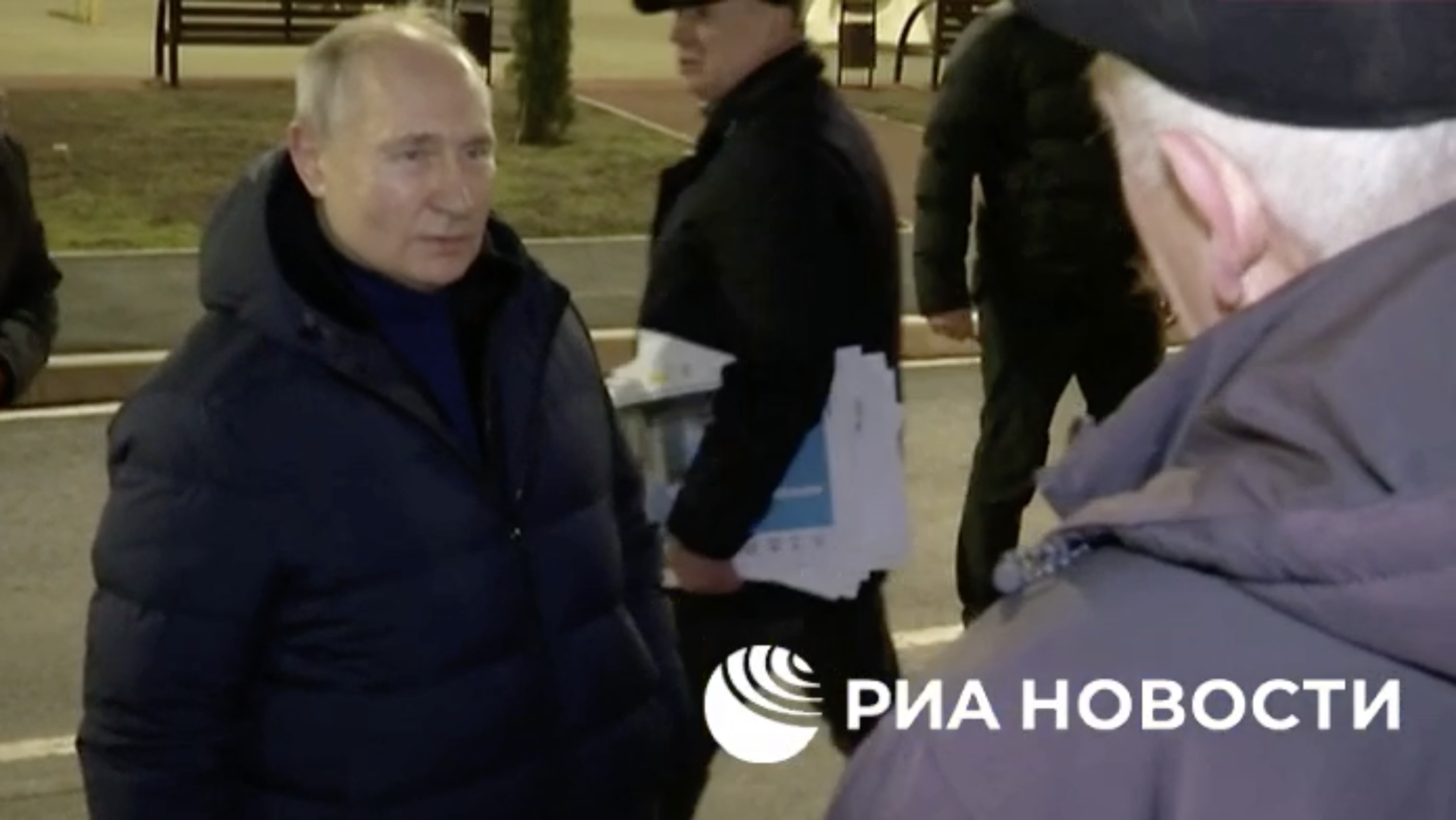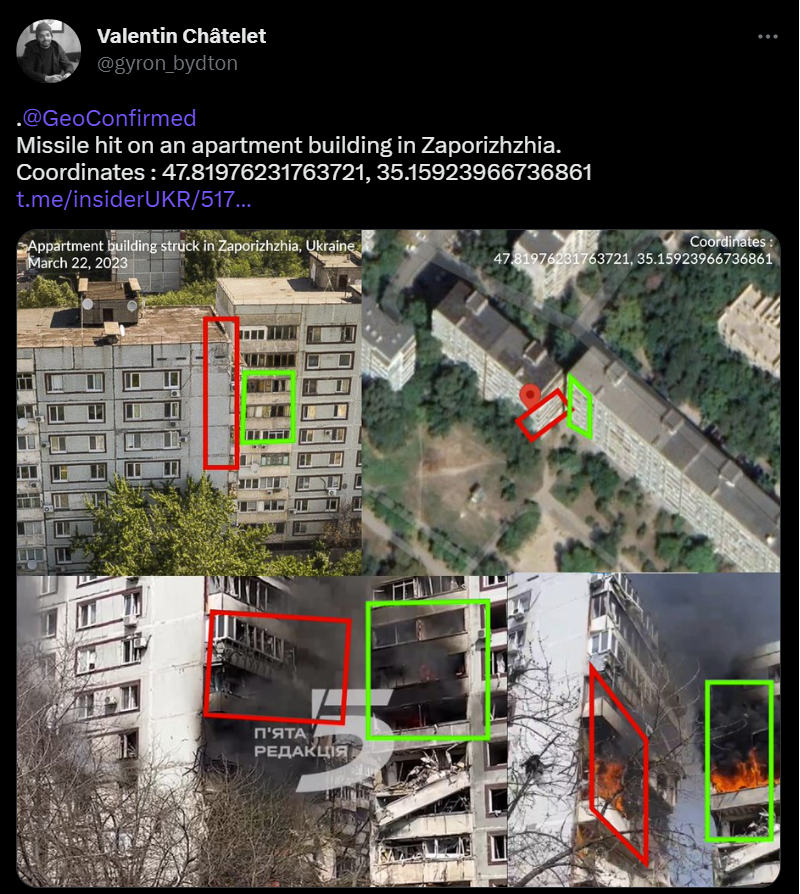Russian War Report: Kremlin edits footage of Mariupol visit to remove women shouting at Putin
After Putin was yelled at in Mariupol, the Kremlin cut the exchange from their official video. RIA Novosti published the whole interaction.
Russian War Report: Kremlin edits footage of Mariupol visit to remove women shouting at Putin
Share this story

As Russia continues its assault on Ukraine, the Atlantic Council’s Digital Forensic Research Lab (DFRLab) is keeping a close eye on Russia’s movements across the military, cyber, and information domains. With more than seven years of experience monitoring the situation in Ukraine—as well as Russia’s use of propaganda and disinformation to undermine the United States, NATO, and the European Union—the DFRLab’s global team presents the latest installment of the Russian War Report.
Security
Tracking narratives
International response
Ukraine likely preparing counteroffensive as Russia diverts forces from Bakhmut
After months of heavy fighting in which Russian forces failed to fully capture Bakhmut, the Ukrainian army is likely preparing its counteroffensive. Ukrainian ground forces commander Oleksandr Syrskyi said on his Telegram channel that Russian forces “are losing considerable strength and are running out of steam” and “very soon we will take advantage of this opportunity.” The DFRLab has observed indications of a Ukrainian counterattack and is closely monitoring the developments.
Meanwhile, Russian forces continue to exert pressure on Ukraine. Ukrainian military intelligence reported that Russian troops will likely focus on targets of military importance in their next missile strikes. Particular attention is being paid to areas with troop concentration, oil depots, airfields, supply routes for military equipment from allied countries, and other logistical facilities. In addition, the possibility of repeated attacks against energy infrastructure or other objects of significant economic importance for Ukraine cannot be ruled out.
A Russian slowdown in Bakhmut could mean that Moscow is diverting its troops and resources to other regions. Russian troops have made gains further north, partially regaining control over the axis to the town of Kreminna. Intense battles have also been underway in the south. Further, Russian forces have become more active in the regions of Kharkiv, Luhansk, Zaporizhzhia and Kherson. Russian troops are conducting offensives in the direction of Avdiivka with the aim of establishing control over Avdiivka and Marinka.
In the occupied Crimean town of Dzhankoi, an explosion reportedly destroyed cruise missiles utilized by Russia’s Black Sea navy to target Ukraine, according to a March 21 statement from Ukrainian military intelligence. The strike appeared to have originated from a drone. A video of the explosion published on March 20 shows the blast was immediately preceded by a loudly buzzing engine which bears audio similarities to the sound made by Iranian-made drones. The DFRLab cannot confirm whether an Iranian drone caused the blast.
—Ruslan Trad, Resident Fellow for Security Research, Sofia, Bulgaria
Missile strike on residential building in Zaporizhzhia caught on camera
Video footage of a missile strike against a nine-story residential building in the center of Zaporizhzhia emerged on Telegram on March 29. The DFRLab identified the location of the missile strike and the apartment complex it struck using geolocation and geospatial analysis. As Ukrainian President Volodymyr Zelenskyy described in a tweet, the strike occurred near a residential area near a mall.

A photograph shared online indicates that an S-300 missile system fired the missile from the Russian-occupied southern bank of the Dnipro River. This location was corroborated by other open-source investigators, including the GeoConfirmed project, which reported that the missile likely came from the southeast direction. Reports claimed the attack caused the death of seven people.
Later that same day, counternarratives emerged on the pro-Kremlin English-language Telegram channel Slavyangrad and spread to a French-language channel. The narrative claimed that the strike resulted from a Ukrainian S-300 system failure while attempting to intercept a Russian missile. Russian news outlets and pro-Kremlin amplification channels have repeatedly used similar narratives to obfuscate Russian culpability in incidents involving civilians.
—Roman Osadchuk, Research Associate
—Valentin Châtelet, Research Associate, Security, Brussels, Belgium
Kremlin edits footage of Mariupol visit to remove women shouting at Putin
Following the International Criminal Court issuing an arrest warrant for Russian President Vladimir Putin, the Kremlin leader paid a defiant visit to the occupied Ukrainian city of Mariupol. The Kremlin shared a thirty-minute video of the visit, which reportedly took place on March 18. During the visit, Putin reportedly examined restoration work under way in the city. Approximately twenty minutes into the footage, Putin has a short conversation with individuals described as residents of Mariupol.
Footage of the visit published by state-owned news outlet RIA included frames cut out of the Kremlin video. The RIA footage includes an extended version of Putin’s interactions with alleged residents. During the filmed conversation, an unidentified female voice can be heard in the background shouting at Putin, approximately eighteen seconds into the clip. Meduza reported that the woman yelled, “This all is not true! It’s all for a show!” While the women’s comments do sound similar to Meduza’s interpretation, the voice is muffled and difficult to interpret with certainty. Immediately after the woman shouts, the officials accompanying Putin react and begin to look around the streets. The Kremlin version of the video cuts away approximately four seconds earlier, switching to another woman speaking with Putin.
A woman can be heard yelling in the background eighteen seconds into this video clip, causing Putin’s entourage to look around for her. (Source: RIA Novosti)
According to Meduza, a Russian journalist described the district visited by Putin as “virtually the only one rebuilt” in the city destroyed by Russia.
—Eto Buziashvili, Research Associate, Tbilisi, Georgia
Russian ministry reports 5,000 offenses related to the spread of “fakes” about the Russian Army
On March 20, Vladimir Kolokoltsev, the head of Russia’s interior ministry, said that in 2022, “Particular attention was paid to preventing the discreditation of the Armed Forces of the Russian Federation.” The ministry reported that last year police documented five thousand offenses and forty-one crimes related to the spread of “fakes” about the Russian Army. In addition, they documented almost ninety cases of “deliberate false publications” about the Russian military.
“In cooperation with Roskomnadzor, the dissemination of about 160,000 false and other prohibited information was stopped,” Kolokoltsev added.
The DFRLab has previously reported on Russian attempts to tighten control of the internet in order to prevent the spread of content the Kremlin considers undesirable.
—Eto Buziashvili, Research Associate, Tbilisi, Georgia
New poll suggests support for the war in Ukraine remains high among Russians
According to independent Russian pollster Levada, 77 percent of Russians supported the war in February 2023, the highest level of public support since March 2022. Only 17 percent of Russians currently disapprove the war, Levada reported.
The number of people supporting the continuation of hostilities has steadily increased since October 2022 “as the shock of the announcement of partial mobilization passed,” Levada concluded.
Seventy-one percent of Russians perceive the return of Luhansk and Donetsk to Ukraine as unacceptable conditions for a peace treaty, while 67 percent see the return of Zaporizhzhia and Kherson regions as unacceptable. In addition, 76 percent of respondents perceive Ukraine’s accession to NATO as unacceptable.
Since November 2022, the share of respondents who believe that the “special military operation” is advancing successfully increased from 54 to 65 percent.
The Levada research center, labeled a foreign agent by Russia, published its assessment on March 13. Russia has cracked down on public dissent since the start of the war; it remains unclear whether this crackdown impacted Levada’s poll results.
—Eto Buziashvili, Research Associate, Tbilisi, Georgia
Armenia ratifies Rome Statute in the wake of Putin’s ICC arrest warrant
On March 24, the Armenian Constitutional Court gave its blessing to the parliament’s ratification of the Rome Statute, noting that the country’s obligations to the International Criminal Court do not contradict the national constitution. The decision is final and went into effect immediately.
Armenia’s plans to ratify the Rome Statute had been complicated by the International Criminal Court’s recent decision to issue an arrest warrant for Vladimir Putin. On December 29, 2022, Armenian parliament approved the draft law, “On Ratifying the Rome Statute of the International Criminal Court,” which then made its way to the constitutional court. Armenia signed the statute in 1999 but did not ratify it at the time.
Armenia’s recent push to ratify the ICC charter appears motivated by the ongoing conflict with Azerbaijan. Armenia initiated the ratification to take Azerbaijan to the ICC over alleged war crimes committed by Azerbaijani troops during the September 2022 invasion, but some observers thought the constitutional court would rule against it due to the Putin arrest warrant.
Human rights defender Artur Sakunts told Caucasus news outlet Jam News that Armenia would end up in a “miserable position” if it did not continue on course to ratify the statute. “We will remain in the status of an ally of a fascist regime – where Belarus is now,” Sakunts added. “And such regimes have no allies, they only have subordinates, colonies, zones of influence.”
Armenia’s Speaker of Parliament, Alen Simonyan, told reporters on March 20 that Armenia had begun the ratification process months before the ICC decision. When asked about the possibility of arresting Putin on a visit to Armenia, Simonyan said, “First, let’s ratify the Rome Statute for now, and then we’ll decide what to do next. I wonder what they will do in other countries in case of his arrival. I just physically can’t imagine it [the arrest].”
—Ani Mejlumyan, Research Assistant, Yerevan, Armenia

